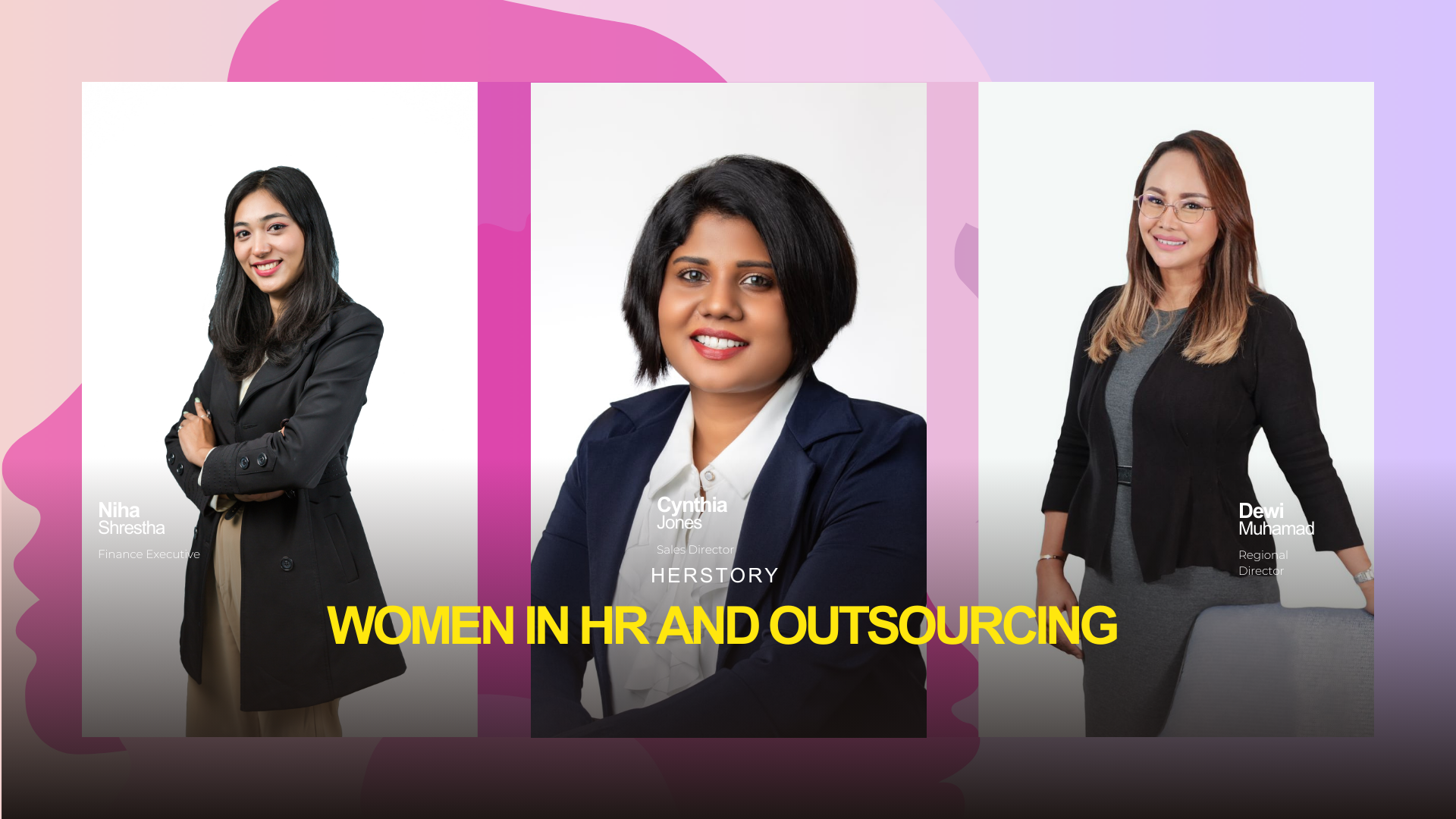Meet the Women of Hexa Business: Cynthia Jones, Dewi Muhamad, and Niha Shrestha
Table of Contents
- Visibility of Women Does Matter
- Why do you think it’s important for women to occupy space in their chosen career, especially leadership roles?
- In your life and/or career, kindly share your unforgettable moment when you doubted yourself because someone discriminated against you and your ability simply because you’re a woman. How did you stand up for yourself and overcome it? What lessons have you learned from it?
- The HR and Outsourcing sector is believed to be a female-dominated industry. Why do you think that?
- How does Hexa help and support you with your personal and professional development?
- What’s your hope for the future of women in the HR and outsourcing industry?
- If you have a message for all the women, as HR professionals and career experts, what would it be and why?
- Outsourcing Reimagined with Hexa Business
One of the biggest challenges that women have to face in their daily lives is the stereotype of who they need to be in society.
Gender roles become a big factor why women in general have a hard time to explore, try, and build confidence in themselves. “Gender roles and the pressures to conform to these roles for women vary across regions, religions and households. One way the pressure to conform manifests itself is through marital status. For instance, in developed and emerging economies, women who have a spouse or a partner are less likely to be employed in a paid job or be actively looking for one,” ILO said. “This can often arise from the economic stability of a partner’s income that can reinforce the “male breadwinner” bias in some marital arrangements.”
Visibility of Women Does Matter
With the competitive market and tough economy everyone is going through, women face harder challenges to find a place that welcomes their talents and recognizes their potential. “The freedom to work— by choice, in conditions of dignity, safety, and fairness— is integral to human welfare. Guaranteeing that women have access to this right is an important end in itself,” ILO added.
This is where the visibility of women does matter. But the question is, how do we accelerate action toward this common goal? Today, as we celebrate Women’s Month, Hexa Business features three strong, independent, and respected women to join the conversation about women for women by women in the HR Outsourcing and Industry, telling their experiences in personal and professional lives, from our Sales Director Cynthia Jones to our Regional Director Dewi Muhamad, and Finance Executive Niha Shrestha.
ALSO READ: 63% Women-led Workforce, Hexa Business Accelerates Women’s Empowerment in Action
Why do you think it’s important for women to occupy space in their chosen career, especially leadership roles?
Cynthia: Women in leadership bring diverse perspectives, drive innovation, and create more inclusive workplaces. Their presence inspires future generations, improves business outcomes, and helps break systemic barriers. Leadership should reflect the workforce it serves, and when women occupy space, they pave the way for a more equitable and dynamic future.
Dewi: Women occupying space in their chosen careers, particularly in leadership roles, is important for several reasons. Firstly, their diverse perspectives lead to well-rounded and innovative solutions. Secondly, women in leadership serve as role models, inspiring younger women and girls to pursue their ambitions.
Thirdly, gender diversity in leadership results in more balanced and equitable decision-making. Additionally, companies with diverse leadership teams often outperform those with less diversity. Ensuring women have equal opportunities for career advancement promotes fairness and equity in the workplace. Finally, women in leadership roles help challenge and change outdated stereotypes and biases, fostering inclusivity and cultural change.
Niha: It’s important for women to occupy space in their chosen careers, especially in leadership roles, because it brings diverse perspectives, promotes equality, and leads to better decision-making. When leadership reflects the diversity of society, it creates more inclusive, fair, and innovative environments, benefiting both organizations and communities.
In your life and/or career, kindly share your unforgettable moment when you doubted yourself because someone discriminated against you and your ability simply because you’re a woman.
How did you stand up for yourself and overcome it? What lessons have you learned from it?
Cynthia: In a high-stakes sales negotiation, a senior executive ignored me and directed all key questions to my male colleague. Instead of letting it undermine me, I confidently took charge, proving my expertise. This experience taught me that competence outweighs bias—self-belief and action are the best ways to challenge discrimination.
Dewi: There was a time when someone told me that I couldn’t survive without a man. I proved them wrong by becoming highly independent. As a single mother with a successful career, I’ve raised my son without seeking help, and I’ve been a good provider to my son and family. I’ve also defied expectations by demonstrating that an introvert like me can excel in convincing people and closing sales.
One particularly memorable moment is when I proved a person wrong who believed I would never succeed in life or career due to my educational background. Today, I’m pursuing my Master’s in Business to show that I can achieve success with or without formal certification.
Niha: I don’t have personal experiences with self-doubt or discrimination. However, I do understand that many people—especially women—have faced moments of discrimination and doubt. It’s such a real and challenging part of many people’s journeys, whether it’s in their career, education, or daily life.
In moments like that, standing up for oneself can come in many forms. It can be speaking out against discrimination, leaning on support from friends and allies, or finding strength within oneself to continue pushing forward despite the setbacks.
One lesson I learned is that confidence doesn’t come from others’ validation, but from trusting your own value. Every time you overcome a challenge or prove someone is wrong, it’s a testament to your strength. Overcoming that kind of discrimination is a continual journey, and sometimes it’s about creating spaces where those who follow don’t have to face the same barriers.
The HR and Outsourcing sector is believed to be a female-dominated industry. Why do you think that?
Cynthia: The HR and Outsourcing sector is seen as female-dominated due to its focus on communication, empathy, and relationship management—skills women traditionally excel in. It has also been a key entry point for women into corporate leadership. However, leadership roles remain male-driven, highlighting the need for greater gender balance at the top.
Dewi: The HR and Outsourcing sector is often seen as female-dominated due to the alignment of required skills like empathy and communication, historical trends encouraging women into administrative roles, details oriented and process oriented
Niha: HR and outsourcing are often seen as female-dominated industries because they require strong communication, empathy, and people management skills—traits that are traditionally (though stereotypically) associated with women. Additionally, these fields focus on relationship building, conflict resolution, and multitasking, areas where women have often been encouraged and recognized.
How does Hexa help and support you with your personal and professional development?
Cynthia: Hexa supports my personal and professional growth by providing opportunities to work in global markets, engage with industry leaders, and take on strategic responsibilities. The company fosters a collaborative environment, encourages continuous learning, and empowers me to refine my leadership skills. This exposure enhances both my expertise and confidence, driving my career forward while aligning with my personal aspirations.
Dewi: I started working at Hexa in 2005 and stayed with the company for almost 8 years. Hexa played a significant role in my career growth and my knowledge of recruitment. I began with a very minimal salary, but at that time, I didn’t mind because I knew I could earn more through commissions. Hexa is a place where you can make a substantial amount of money—your hard work pays off when you see those five-figure commission checks.
From my experience at Hexa, I learned that to succeed in your career, you must not put a limit in learning new things. Good results come from a good process. Trust the process, and the numbers will follow.
Niha: By giving access to training courses, workshops for developing skills, and career counseling, Hexa promotes both professional and personal growth. They take care of administrative duties like benefits and payroll, giving workers more time to concentrate on their professional development. Furthermore, they frequently provide wellness initiatives, performance evaluations, and mentorship, assisting people in enhancing their professional and personal well-being.
ALSO READ: Find the Right Virtual Assistant, Check the Top 7 Virtual Assistant Companies for 2025
What’s your hope for the future of women in the HR and outsourcing industry?
Cynthia: I hope to see more women in top leadership roles within the HR and outsourcing industry, breaking barriers and shaping strategic decisions. Beyond representation, I envision a future where women are recognized for their expertise, innovation, and leadership, rather than being confined to traditional roles. By fostering mentorship, equal opportunities, and inclusive workplaces, we can create a more balanced, empowered, and dynamic industry for future generations of women.
Dewi: My hope for the future of women in the HR and outsourcing industry is to see increased leadership roles, equal opportunities for advancement, better work-life balance, robust mentorship programs, diverse and inclusive workplaces, ongoing skill development, and greater awareness and advocacy for gender equality. Women will thrive and lead the way in creating equitable and inclusive workplaces for everyone.
Niha: My hope for future women in HR and outsourcing companies is that they continue to break stereotypes, take on more leadership roles, and drive innovation in the industry. I hope they are recognized not just for their empathy and communication skills but also for their strategic thinking, decision-making, and ability to shape organizational success. Most importantly, I hope they work in environments that value equality, growth, and empowerment.
If you have a message for all the women, as HR professionals and career experts, what would it be and why?
Cynthia: Own your expertise, embrace challenges, and never let anyone define your worth.
Dewi: Believe in your strengths and trust in your abilities.
Niha: Never be afraid to take on leadership roles, have faith in your skills, and welcome lifelong learning. Your skills, voice, and viewpoint are effective instruments for bringing about constructive change in any organization.
Why? Because breaking down obstacles requires confidence and a growing attitude. Women in HR and related professions possess a special ability to teach upcoming leaders, create inclusive work environments, and make a significant difference for both individuals and entire companies.
ALSO READ: What Is Staff Augmentation? (+ Best Practices & Examples for 2025)
Outsourcing Reimagined with Hexa Business
With over 20 years of HR and Outsourcing expertise in the ASEAN region, Hexa Business continues to empower women to advance their careers and achieve their goals, making a difference in lives, taking the lead, and owning their stories.
“Having women in leadership at Hexa fosters diversity, innovation, and balanced decision-making. Their perspectives enhance teamwork, boost morale, and strengthen our company’s reputation. Promoting women in leadership also creates mentorship opportunities and inspires future leaders, helping Hexa grow and succeed,” said Hexa’s Senior HR and Admin Executive, Clarisse Ramirez
Hexa Business is strategically present in Bangladesh, Indonesia, Malaysia, Myanmar, Nepal, Philippines, Singapore, Sri Lanka, Taiwan, and Vietnam, providing excellent EOR services to businesses who like to expand, outsource, and grow their business. Learn more about how we can help you with your outsourcing needs today.
Meet us here.





